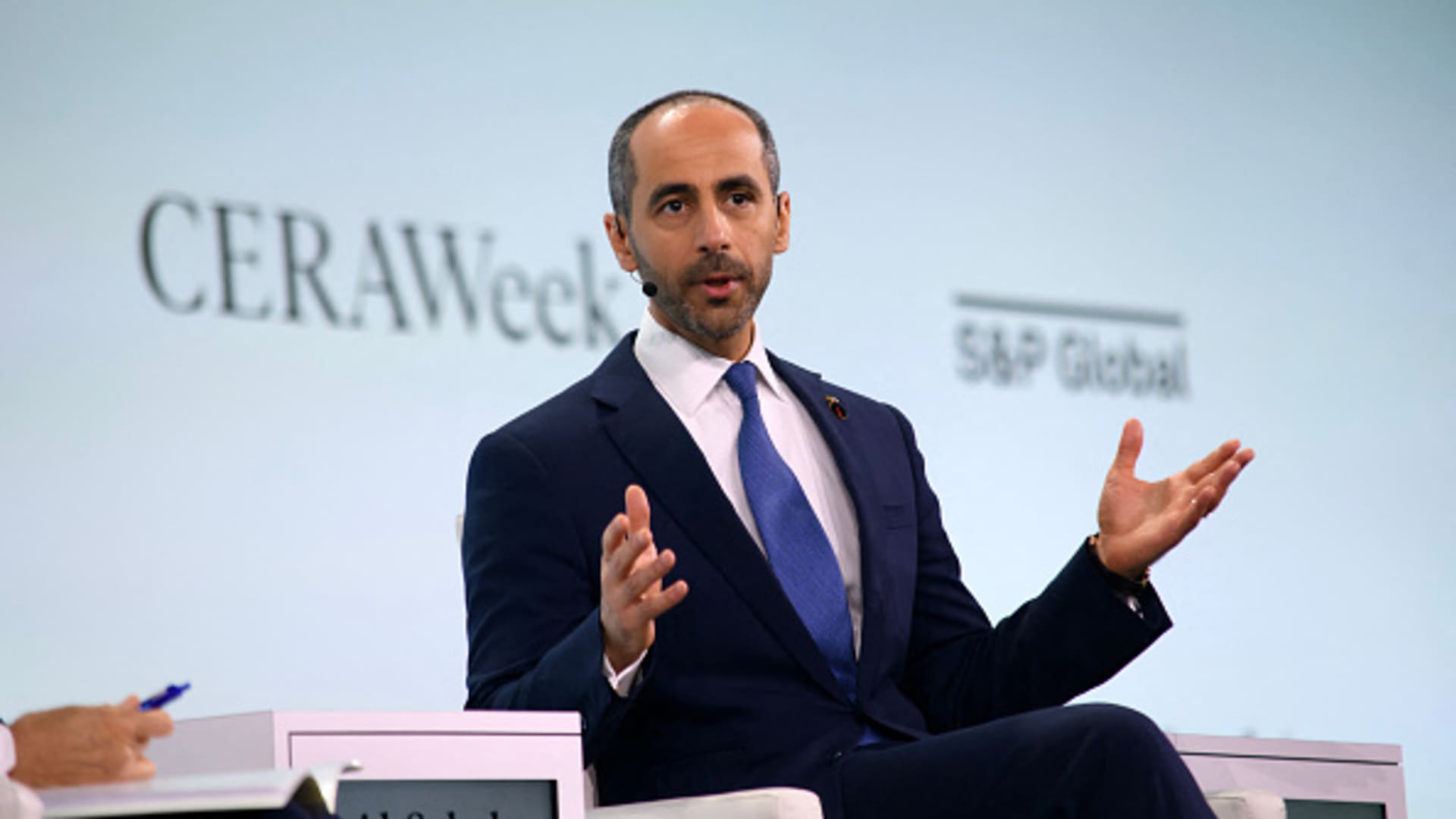Kuwait Petroleum Corporation Deputy Chairman & CEO Shaikh Nawaf Al-Sabah speaks during the CERAWeek oil summit in Houston, Texas, on March 19, 2024.
Mark Felix | Afp | Getty Images
HOUSTON — The crisis in the Red Sea could lead to a shortage in the global tanker fleet if disruptions persist for another six months, the CEO of Kuwait Petroleum Corporation told CNBC.
Houthi militants have been striking commercial shipping in the Red Sea since November in support of Palestinians as Israel wages war in Gaza. The attacks have forced many container shipping and tanker companies to divert traffic around the Cape of Good Hope in southern Africa, adding time and cost.
“One of the things I think we may be concerned about is if this continues for another six months, that we will not have perhaps the tanker fleet available to continue to go around,” Shaikh Nawaf al-Sabah said of the global fleet during an interview at the CERAWeek by S&P Global energy conference.
KPC has diverted a substantial amount of production around the Cape during the crisis, al-Sabah said, declining to provide specific numbers. The company is continuing to ship through the Red Sea and is making decisions on which route ships should take on a daily basis, he said.
“We maintain a strategic tanker tanker fleet for these types of reasons,” al-Sabah said. “We’re comfortable that we can supply our customers in the quantities that are required on time without issue, but I don’t know how many other producers have that strategic vision.”
Al-Sabah does not see a risk of Middle East tensions leading to a conflict that could disrupt crude supplies in the wider region. The Persian Gulf has faced numerous wars but the only time Kuwait has been unable to ship was during Iraq dictator Saddam Hussein’s invasion of the country in 1990, he said.
“I don’t see a supply fear,” the CEO said. “I am confident that the industry and the system is well equipped to handle potential supply crises that might happen.”
Chevron CEO Michael Wirth, however, said the security situation in the Middle East is “tenuous” and “could pivot on a dime.” Wirth told CNBC that Chevron is “not moving ships to the Red Sea.”
“Today the conflict in Israel and Gaza goes on, a resolution does not seem to be at hand and the regional risks continue to be high,” Wirth told CNBC’s Brian Sullivan at CERAWeek
China demand, U.S. production
Crude oil futures have risen this year, but have struggled to break out amid uncertainty over the health of China’s economy and the strength of U.S. crude production. Last year, fears that demand was slowing in China as U.S. production hit a record 13.3 million barrels per day weighed on prices.
Al-Sabah said he is not worried about crude demand in the world’s second-largest economy.
“I visit our partners in China frequently and the feedback I have from them has always been if you have additional supplies, we are willing to take it,” Al-Sabah said. “The demand has increased steadily in China and it’s been solid.”
ConocoPhillips CEO Ryan Lance said in remarks at CERAWeek that U.S. crude production growth will slow to 300,000 to 400,000 barrels per day this year, from 1 million barrels last year. Total U.S. production will eventually exceed 14 million barrels per day at some point this decade and then plateau, Lance said.
As crude prices fell last year, OPEC and its allies agreed to cut production by 2.2 million barrels per day to support the market. Those cuts will remain in place through at least the second quarter of this year.
Al-Sabah said he does not see U.S. production as a challenge to KPC’s market share as OPEC holds barrels off the market. KPC plans to increase its production capacity to 4 million bpd by 2035 from 3 million bpd today.
“Looking into the second half [this year], I see more opportunities for upside in terms of demand than I do for downside,” Al-Sabah said. “We will continue to be supplying into a market to maintain balance and stability.”

